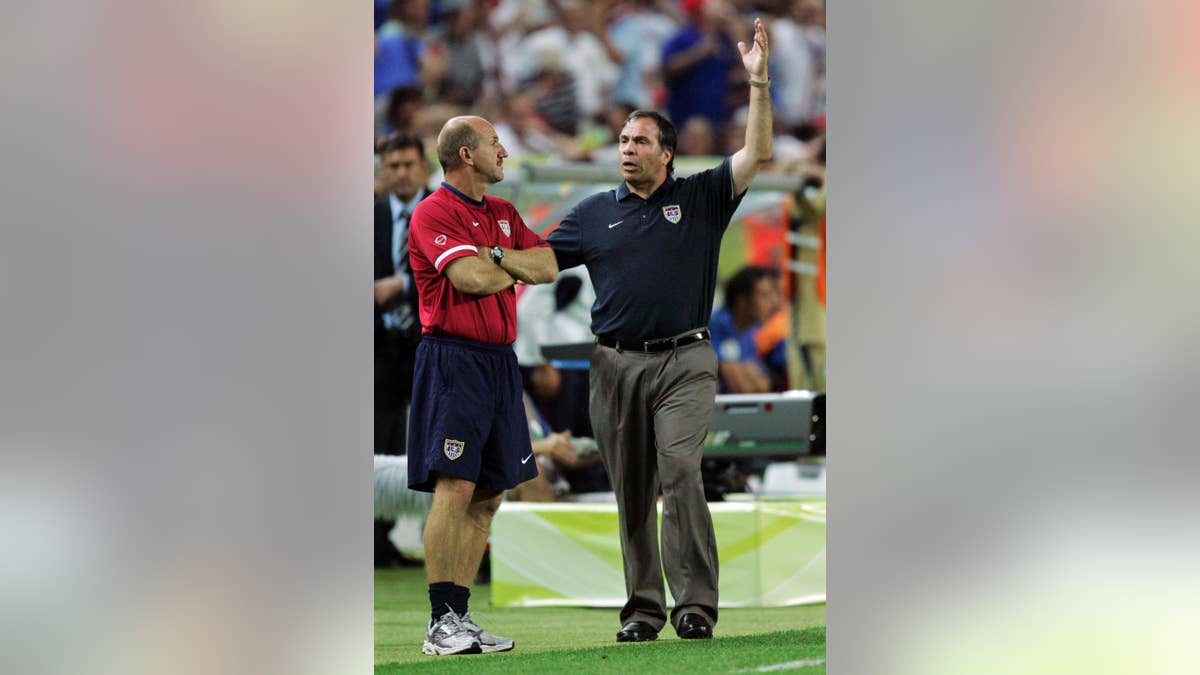
FILE - In this June 17, 2006, file photo, USA coach Bruce Arena, right, reacts after a USA goal was disallowed in the second half of their World Cup Group E soccer match against Italy in Kaiserslautern, Germany. Back in charge of the U.S. national soccer team for the first time in a decade, Bruce Arena views the Americans’ state as urgent following losses in the first two games of the final round of World Cup qualifying. (AP Photo/Kevork Djansezian, File) (The Associated Press)
NEW YORK – Bruce Arena knows the job of U.S. soccer coach has changed since his last game a decade ago.
"We're going to have a lot of pressure on us," he said Wednesday during an interview at the offices of The Associated Press. "We're not only expected to qualify for the World Cup, we're also expected to be successful in group play and to get into the round of 16 and then hopefully the quarterfinals."
Arena took over from Jurgen Klinsmann last week following losses at home to Mexico and at Costa Rica in the opening two games of the final round of World Cup qualifying. The Americans plan a pair of exhibitions in January, and qualifying resumes at home against Honduras on March 24 followed by a match at Panama four days later.
"They've got to be convinced the way we're going to play is the right way, and they've got to be convinced to play for each other. The bottom line is we have to be a better team than we've been in the first two games of this competition. So the concept of team and putting that ahead of everything else is going to be critical," Arena said. "I think you'll see changes — I think changes everywhere, not radical, but our mentality will be different, our approach will be different and, hopefully, the results will be different."
Arena spoke before heading to Toronto for the second leg of a Major League Soccer conference semifinal against Montreal. He then goes to Europe to speak with German-based American players.
"Today with professional athletes, maybe a majority of the job is preparing them mentally to play," he said. "We know they have the skills and the physical qualities to be successful. We've just got to deal sometimes with the 6-to-8 inches between the ears to get them headed in the right direction."
As Arena watched the 4-0 defeat at Costa Rica on Nov. 15 on television, he was alarmed.
"I thought they were in a difficult situation, and there would be some thinking about making a change," he recalled.
Six days later, he was asked to take the job he held from 1998-2006.
Arena led the U.S. to the 2002 World Cup quarterfinals, then was fired four years later after a first-round elimination.
"Our fan base is way ahead of what it was when I started in '98 and ended in 2006," he said. "And now, with the obvious emergence of social media, it's 24 hours a day. So we're going to have a lot of pressure on us, and that's all part of it. That's what we sign up for. So we look forward to the challenge."
Because three of the six teams qualify from the hexagonal, as the final round of the North and Central American and Caribbean region is known, the U.S. can rebound quickly.
"We want from the opening whistle to be a team that gets after it and plays hard for 90 minutes," he said. "The first camp will be difficult in March when we have the entire team together. But we have enough experience as coaches to understand the qualities of our players, how to organize and teach them and get them feeling comfortable by the time they kick off against Honduras."
Arena has spent the past eight years coaching the LA Galaxy. During his first term with the U.S., he said American players didn't get sufficient respect around the world. That, he said, has improved.
"The American player is generally a good player. What we lack is the real elite player that some of the other countries have," he said. "But we have a good, solid base of players, and I'm confident they can play against anyone in the world."
Arena is excited about the age of the current player pool. Aside from goalkeepers Tim Howard (37) and Brad Guzan (32), the only regulars older than 30 are defender Geoff Cameron (31), midfielder Jermaine Jones (35) and forward Clint Dempsey (33).
"There's a lot of players entering their prime, which in our sport is about 28, 29 years old," Arena said. "We're not too old and we're not too young. So there shouldn't be any excuses. We have enough experience and enough quality to be successful in qualifying."
